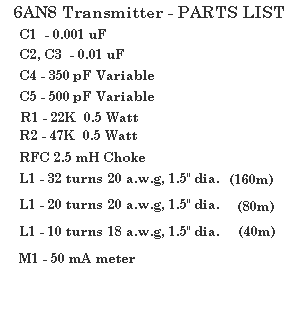




These Triode-pentode tubes
are really two tubes in one envelope. They were highly popular for home audio
applications in the late 1950s and throughout the 1960s. You could get
reasonably nice audio for driving a loudspeaker with a few watts and get the
whole amplifier in one or two tubes.
6AB8/ECL80
Tube Pin-outs:
1 = Pt
2 = Gt
3 = Kt, Kp
4 = Htr
5 = Htr
6
= Pp
7 = G3p
8 = G2p
9 = G1p
6BM8/ECL82
Tube Pin-outs:
1 = Gt
2 = Kp, G3p
3 = G1p
4 = Htr
5 =
Htr
6 = Pp
7 = G2p
8 = Kt
9 = Pt
6DX8/EL84
Tube Pin-outs:
1 = Gt 2 = Pt 3 = Kt 4 = Htr 5 = Htr 6 = Pp 7 = Kp, G3p 8
= G1p 9 = G2p
6XX8/ECL85
Tube Pin-outs:
Base 9LY
1 = Pt 2 = Gt 3 = Kt 4 = Htr 5 = Htr 6 = Pp 7
= G2p 8 = Kp, G3p 9 = G1p
6GW8/ECL86
Tube Pin-outs:
1 = Gt
2 = Kt
3 = G2p
4 = Htr
5 = Htr
6 =
Pp
7 = Kp, G3p
8 = G1p
9 = Pt
Note: These tubes are all Triode-Pentodes, but the ECL80 alone has an internal connection between the two cathodes, which are connected to pin 3. Both the ECL82 (6BM8) and the ECL86 (6GW8) have separate connections to each cathode. The ECL80 pentode section has a SEPARATE connection for the Suppressor Grid (7) and the Cathode (3)
ECL80/6AB8 will give you about 2-3 Watts RF out, ECL82/6BM8 will give about 8 watts. ECL83 will give about 6 Watts. 6DX8/ECL84 and ECL85 will give maybe 8 watts and ECL86/6GW8 will give about 12 Watts out.
Other tubes with some interesting possibilities: 16GV8, 18GV8, 30PL15, 6GV8, CV10707, PCL805, PCL85
I would like to some day build a rig with a 2E26 final at about 25-30 Watts RF. I have kept some around hoping to find time to do that.
Another tube that would be very interesting to try in a glowbug transmitter is the 6HU8, which is equivalent to the European ELL80 is a dual PENTODE output tube intended to give 6 Watts + 6 Watts stereo output, or as a push-pull 15 watt amplifier. You could probably use it to make a fairly compact 20 Watt transmitter!
CQ Magazine, March 1989: 6BM8 Transmitter
QST, March 1971: McCoy, Lewis G. and Wilson, Gus. It uses a single 6T9 triode-Pentode. The triode section is a Pierce oscillator, and the pentode power amp section is the final. It puts out about 5 watts trouble-free.






SEARCH THIS SITE
